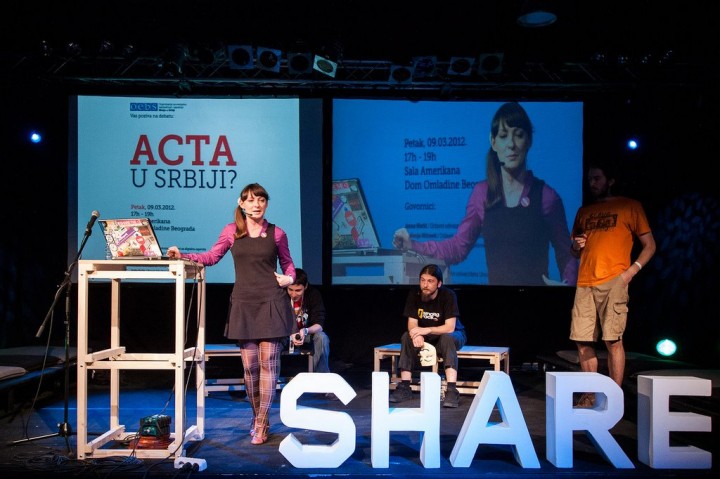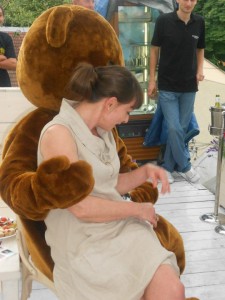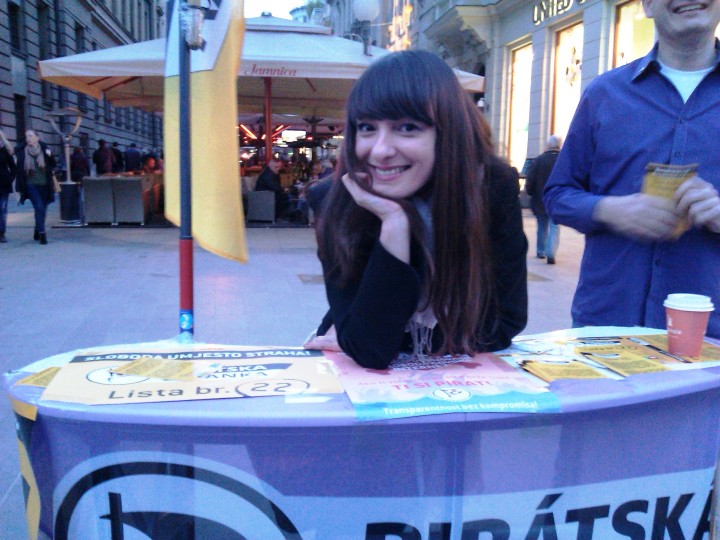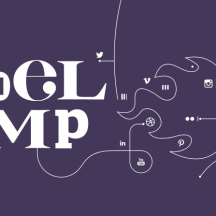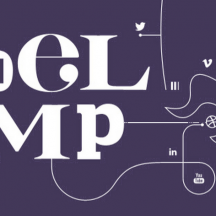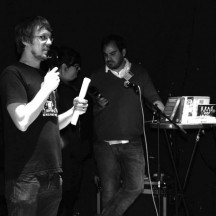Jelena Jovanović is the founder of Cybernaut & Friends agency for integrated marketing communications, pre-politically active in Pirate Parties International and a member of a few organizations relevant to cyber-space. We have been planning this interview for a long time – and it has turned out to be very different from other Babel Guide interviews (past ones as well as future ones, I suppose). Take the time to read it, I really believe it is worth. I’m glad we’ve made it!
Even for many people in Eastern Europe Serbia is a strange country. A bit exotic, with remnants of war, famous for gypsy music and rakija. But I guess these stereotypes are quite distant from the everyday reality of a social media specialist. How do you perceive stereotypes others have about your country?
Stereotypes can only help: a romanticized perception of an exotic country – yes, we like it; this is exactly why people who visited Belgrade once often come back  Serbia is a country which was once upon a time very open to Europe, thus it seemed much less “far away”. Yugoslavia was considered even progressive to some extent and the „export image“ of the former Yugoslav republics is still problematic for many of us because of the wars we had and the NATO bombing. The fact that we are simply an ordinary European nation (though beyond the eurozone) and the fact that Kosovo is the most frequent keyword when googling “Serbia” makes the image of Serbia somewhat blurred and not easily distinguishable. However, the majority of people don’t have any complex, especially those who are digital entrepreneurs or those involved in non-governmental and/or civic organizations. Basically, what we are trying to do is to alter the old fashioned romanticism concept which involves nationalities, pride and territorial ambitions. Sometimes altering a new reality is easier than burying these concepts that survived from the 19th century to the post-industrial epoch; Ex-Yu countries will work for years on fixing the „image damage”, but the only change can come internally. PR and branding is just a cherry on the top.
Serbia is a country which was once upon a time very open to Europe, thus it seemed much less “far away”. Yugoslavia was considered even progressive to some extent and the „export image“ of the former Yugoslav republics is still problematic for many of us because of the wars we had and the NATO bombing. The fact that we are simply an ordinary European nation (though beyond the eurozone) and the fact that Kosovo is the most frequent keyword when googling “Serbia” makes the image of Serbia somewhat blurred and not easily distinguishable. However, the majority of people don’t have any complex, especially those who are digital entrepreneurs or those involved in non-governmental and/or civic organizations. Basically, what we are trying to do is to alter the old fashioned romanticism concept which involves nationalities, pride and territorial ambitions. Sometimes altering a new reality is easier than burying these concepts that survived from the 19th century to the post-industrial epoch; Ex-Yu countries will work for years on fixing the „image damage”, but the only change can come internally. PR and branding is just a cherry on the top.
Working hours of a social media specialist are pretty much like anywhere else, we monitor, we report, we engage people into brand storytelling. What makes the difference here is that Slavic nations are more talkative and unlike in other EU countries tweet-ups and meet-ups of communities are massive and happen on almost regular basis. We help each other and for many of us borders are irrelevant. Business speaks the international language. And the Internet is a sexy thing! It significantly improves economies, Serbia’s included.
Serbia is a country in transition, one of the former Yugoslav republics. Perhaps not a very handy one because changes are much slower than the digital generation would expect them to be. Our newly elected Government, our Constitution and laws are not enabling good things to happen, but hardly following what happened 10 or more years ago in other countries, i.e. e-money is yet to be defined. Some of the recent game-changing happenings – like the crowdsourced constitution that Iceland brought to its people are not even published in Serbian media, it all went bellow the radar except for the blogs. Obviously editors and journalists either don’t find it exciting enough (“no blood – no revolution!”) or they are not familiar with the concept of crowdsourcing: gaining strong support for innovation can happen only by inclusiveness. Daring to be different, smarter, faster or/and better is possible with nationwide support and only by involving the people in the process of making such a decision and reshaping the legislative. We need someone to introduce these things to Serbia. I am not talking about some romantic Slavic messiah but about young people of Serbia (and neighboring countries, why not) who are not afraid to speak up.
The free, open Internet is not going to defend itself alone; we need to get a little bit political about freedom. Though I am not sure we should talk to our governments about trust that is lacking, or about Bitcoins and stuff that is going to come, very fast, to the broad public…
From the few contacts I have had I have learned Serbia is quite mixed when it comes to using Latin or Cyrillic alphabet with the on-line environment mostly writing in roman letters, is that correct?
Both alphabets are in use in Serbia. The Cyrillic alphabet is designated in the Constitution as the “official script”, compared to Serbian Latin’s status of “script in official use” designated by a lower-level act.
You might wonder what happened: when the Yugoslav republics split apart, Serbia and Macedonia stuck to their traditional alphabet, Cyrillic, and the rest of the countries moved on with Latin. With Google and content marketing it became clear that for search engine optimization using the Cyrillic alphabet is much more convenient, the results are clearer and can appear faster. And why? Just because Latin is dominant, so there is less competition with Cyrillic. So basically there is no correct and incorrect answer, both scripts are available and in use; depending on customers’ needs marketers use one or the other concurrently, overlapping each other on the web. And citizens are free to shift between the Cyrillic and Latin alphabets for their private use, too. Apart from rules, Cyrillic is perceived lately as nationalistic. Right winged media use it, and there is no option to switch to Latin alphabet. Many people who really like the Cyrillic alphabet now have to explain that they are not pro-fascists, which is lame. We should rehabilitate Cyrillic alphabet for the good people of Serbia.
You have been working as a journalist and marketer – but how did it all start, what did you study and how did it effect your later career?
Is this interview going to transform into a confession of a former journalist?  I would like to be able not to mention how tough it is for media outlets in Serbia to become or to stay independent and how investigative journalists are cocooning and staying away from social networks for many (mostly security) reasons.
I would like to be able not to mention how tough it is for media outlets in Serbia to become or to stay independent and how investigative journalists are cocooning and staying away from social networks for many (mostly security) reasons.
I studied national literature and language. At the time I was going to choose my field of research I was totally sure that I was deeply into social sciences, deeply extrovert, eager to express myself, never tired of communication. Basically 15 years ago I hesitated between philosophy and literature, and the Arts won. Narratives, discourses, all those mesmerizing things I adopted at the university are beneficial for the content marketing, PR and branding. To be able to tell the story about a brand confidently, with flair and passion, well no one is born with that, it usually comes from reading fiction and poems, not from watching reality shows on TV and reading tabloids. I would certainly advise all people who want to pursue PR as their career path to spend some time with the Arts, to learn how artistic minds work and especially to get familiar with the dynamics of the media. It would be much easier for them not to hate journalists or creative teams but show how to build bridges between these industries. PR and journalists have tense relations because of the difference in their goals and it comes as natural and normal. But with social media we all became aware how deep is the rabbit hole and the divide between them go. I am lucky to have a classical education and to be familiar with both sides of, basically, communication and information transfer. Best of both the worlds.
Working as a marketer in Etarget, which is an online advertising company with its presence established in 9 European countries, made me sensitive to cultural differences. On top of that I felt alienated when I started to work in Serbia, on one hand I have noticed that my country has made a significant progress and things are going better for Serbs and on the other hand I forgot how important the feeling of belonging to your nation is and how restrictive groups are when it comes to “shared memory” and especially “shared emotions”. To illustrate this: all my contracts (after I left Etarget and became entrepreneur) were terminated shortly after I joined the Pirate Party and the Pirate Parties International. All clients have been replaced by new ones – those who are proud to have someone who “fights” for the Internet freedom. But it took time and strength to experiment, to develop a different strategy, to create a new team of people who are originally from within the Internet, and have no fear of it. Why did they drop? Honestly, I have no idea. Currently none of my clients comes from Serbia. And of course, all my clients are strictly hi-tech companies. When someone talks about a highly specialized field in a meaningful way, that’s the publicity they can get. PR is not “one size fits all solutions” and I am really happy when my clients realize what kind of publicity they can receive by having PR breakthrough made both through traditional and online media, and through online communities.
Our latest PR breakthrough for Topomatika, a company that develops activities in the SEE region, was a great pleasure. I worked on promoting optical measuring and 3D scanning at the International Tech Fair in Serbia. What happened is that the community around my more or less casual tech + political posts on Twitter engaged in the topic, and I discovered a brand new media e.g. for open source archaeologists to work with. Identifying stakeholders is not an easy task, and when you really love what you’re working on it seems easy and playful. No matter how “new” the topic is, it has to be appealing to broader audience. Sometimes I have to work hard with the client to explain why “broader” and not “targeted” is also very good for business. Should brands entertain and convert people? I think they should.
You have run a blog for a long time. What do you think are some golden rules for blogging? Would you say that your blog was more than a way of spending free time and a personal hobby? Did it also help you in your professional career?
I started a blog when it was already mainstream, in 2006. And within the first few months I began to be introduced to different communities, at that time to Human Resoruces people, as a “blog celebrity”. I had my private reasons to run it back then. Very soon I was asked to promote different things on owned and shared media and my hobby quickly turned into a content marketing manager position, even a board member at some point, when I was working on international PR. The blog is sometimes the only way to break the news. I have a blog on Blic.rs which is one of the highest ranked media outlets in Serbia.
Did it help you when deciding to be a freelance marketing specialist? You were a journalist (freelancer?), then worked in eTargert – was it a big step?
My job description was to develop content marketing strategy and business around online communities and I am proud to say it was the first so called “corporate” blog with a human face – on blog.etarget.rs we had many comments, encouraged many positive emotions around “dry” topics such as online advertising and e-commerce and gave out many free entries for conferences and events. Working under the Creative Commons license, writing e-books and guides was an extremely rewarding experience. I had the opportunity, unlike many of my colleagues, to “walk my talk” and to keep the integrity of sharing the culture we live in and are so often opposed to. Advertising, which is payed promotion and blogging, which is part of the free and sharing culture, usually don’t go well together. I made it work, or rather – my colleagues and me made it work.
We are all living in a beta–world, always testing, always redesigning, making corrections, nothing can ever be finished. Maybe it is not a perfect excuse for why I barely have time to blog. But that’s OK. I keep my drafts with the idea that someday I will make something of them, maybe a book? Recently I discovered it is much easier to write a blog article in the body of e-mail, just like when one’s writing a letter to someone. It keeps BS away, sentences are straighter and the article is never too long. Maybe this is where our culture is going? Maybe the next phase will be recording conversations and publishing them as podcasts or articles? Time is such a precious resource and attention is the most valuable asset. All marketers are yearning for it.
Facebook is No. 1 in the whole of Europe and Serbia is not an exception. As a social media specialist, are there local networks I have to consider when planning any campaign?
The most efficient way to throw money away is to select only one type of promotion. And if it’s global, such as Google, and if the campaign is not localized for a region or a country, it can be the biggest mistake you ever made. In the Slavic countries many networks and search engines are on stage outperforming global services such as Google. Serbia and Croatia, as well as Romania and especially the Czech Republic have their own social networks and sometimes national search engines who outplay Google and Yahoo. Russia is not an exception. Depending on the target audience, a campaign can be created to reach different types of people. For instance Google+ in Serbia is very unpopular. And in Russia there is almost no Facebook – they have their own social networks. In the Czech Republic you have Seznam and in Romania hi5 was unbelievably popular. Being aware of the differences might help companies to choose the right agency or the right consultant for them. It’s very disturbing for me to come at the end of the game and realize how expensive and ineffective Google ads campaigns were for my clients. It seems that what is obvious to marketing people, that campaigns MUST be localized, is not obvious to everyone. And resources they burn on “one-size-fits-all” campaigns are a total marketing disaster. No marketing can go without serious tachycardia when facing these things and we have to be ready to repeat it again and again… do not trust Google. Localize. Do not only translate keywords from the original web site, ask for professional help.
I know you have had a recent experience with Groupon-like servers. In the Czech Republic, Slevomat, the leader in a daily deals segment is kind of a big deal  What is this scene like in Serbia?
What is this scene like in Serbia?
In Serbia there are too many Groupon-like websites, all similar. And that is a road to hell – one that comes last, has to offer either the best prices or the most likeable campaign and inventory. Which is a heavy task: right now there are over 30 Groupon-like websites. I personally have a problem with this impulsive shopping – I don’t have time to spend a few valuable vouchers, they are still with me and I will have to negotiate if I want to get value for money. And I am not the only one – we are living in impulsive times, buying stuff online sometimes is just a form of procrastination. I am sure investors would have more use of skilled consultants who would be able to tell what area in e-commerce they should invest in. There are a lot of other different “white spots” in the region of the Western Balkans, but Groupon-like sites have lost their glamour since 2010. And no one really cares about them as much as before, though rate of people who buy online is increasing. The important thing is that Digital Agenda in Serbia promotes e-commerce. These e-books are of extreme use for all those who are worried about online safety while shopping (PDF for download, in Serbian) and I was glad I took part in this project. Changing the perception is always exciting. Maybe Groupons will have their revival in years to come. Maybe earlier if they have competitive offer.
Your generation still remembers Yugoslavia – what about the neighboring countries, are you better connected with other YU countries or just the very opposite?
New generations and for some reason I feel the same, see borders as an obstacle that has to be moved in order to meet their, for instance, Facebook friends. I barely remember Yugoslavia. When Tito died I was 4 years old and all I remember is that all kids were released from childcare before noon, our parents picked us up before lunch. All Yugoslavia was out of order for a few days and from a child’s perspective of course it was extremely strange to see so many people crying publicly. But that’s it. Yugoslavia was somebody else’s past, not ours, we barely had any benefits from being “Yugoslav”“ – except for a few vacations at the Croatian seaside, nothing has left any memories. I am not saying it was either a good or a bad thing – Yugoslavia was huge imaginarium, a revolution people worked on since the 19th century. Given for how many generations they worked on pan-Slavic connections it feels sad that the idea was drowned in bureaucracy and negative selection produced by communists (yes, it’s still alive and well, thanks for asking!). However business accepts no limits. Just as culture, music, books, comics. There is a significant amount of cross-border projects right now and they are only the beginning.
You visited Prague because of the Pirate Parties International meeting – being elected as a member of the Executive Board. What made you become a Pirate Party member?
Honestly I felt that is where I exactly belong It felt very good to have so many people in the Pirate Parties International coming from different backgrounds and yet united around the same ideas – the Internet freedom, copyright reform and the right to protect privacy. Nothing regarding joining the Pirates was what would one call “rational” behavior. That decision was light-weight and came naturally. Later I discovered how many people in the country I live in still think that having an opinion on politics is a bug and not a feature, and how limited their freedom of speech and expression is. We are here to share our freedom with people, to teach them how to make changes and feel good about who they are. And that is what “creating an alternative” means in Serbia – being different is usually accompanied with “not having the right to be heard” or “being isolated”. The Internet is quickly changing that model and people are not dependent only on friends they know from school or their neighborhood – it’s somewhat easier now to find people who think alike and work together towards the same goals. In this context the Pirate Party is libertarian on so many levels… My mandate in PPI is over and in 2013/2014 I’m an alternate board member, which means if anyone resigns, I will to jump in and catch up with the projects easily. I also function an international coordinator. I must say founding a party in Serbia is not easy as in the neighboring countries – we need 10,000 signatures and the registration costs are pretty high. Though very small, Serbia is like the Weimer Republic, with more than 100 parties, and the entry barriers have been raised recently, so no alternative young politicians can ever appear easily. For instance, to found a party in Croatia, the Pirates needed only 100 signatures and they collected them in a tattoo studio. The Croatian Pirates also achieved good results in the local elections held last weekend.
Do you think pirate parties in Eastern Europe can reach the same kind of success as it has happened in Germany?
The Swedish Pirate Party celebrated their 7th birthday on January 1st. I firmly believe Pirate parties that manage not to split and to start a seven-year troll-war years will be able to achieve political success :- ) What is more important than having a representative in the Parliament or the Government is that Pirates truly change the countries they emerge in. They change culture and they have significant positive impact on the economy too. For instance, industry debates on how piracy can help economies are really a good thing. The age of conversation has started and taking part in discussions regarding the digital world is an important part of gaining power. And the Pirates want to exert their influence through valid discussion and political participation. Basically this is what we are most capable of, along with similar organizations like the Internet Society. Building the infrastructure, building a connected world without commercial interests and limitations imposed by telecoms or governments, that is a task for everybody who appreciates freedom and wants to share that freedom with others. And I have to say some governments can learn a lot from Pirate Parties when it comes to transparency, non-secretive meetings and participation and online collaboration in the decision-making process. Of course, the future is fine, thanks for asking! Hopefully will see each other on The Pirate Bay birthday on 10th August. Pirate party of Sweden will organize something exciting too 
It seems to me that many people appreciate that even as a journalist you always kept a very positive attitude and no matter what you did, you were looking on the bright side. What is the secret of holding on to the positive side of things?
Positive people are sometimes born and sometimes made. I belong to those who were resilient enough and had enough courage to “take the higher road”. Otherwise it would be…well, just too easy to comply with the mentality here in the Balkans and to never stop complaining about everything under the Sun. Everyone has their dark side, the main task is to get familiar with it and to accept it. And there are not many things which are more rewarding than to see that you achieved a positive impact to someone. People can get really far only by going together. And “together” means a constructive, building, maybe even little bit enginereeing mentality. And of course, you might know that joke about a pony and an optimitic child – I find it very true, sometimes I think I was given a pony too  Probably I’m not the only one!
Probably I’m not the only one!
Six + 1 tips from Jelena Jovanović
-
Get yourself to Twitter. Even if Twitter is not that popular in your country keep in mind that lots of journalists, researchers and valuable resources are there. Try to talk to your politicians – many of them are skilled in e-diplomacy and not too reluctant to provide answers when asked. Follow your officials, keep asking them, and keep bringing light to your issues, even if you are not part of any civic organization. Activism is good for your soul!
-
Re-connect with Art: Choose whatever fits you best. Sometimes 9gag and Mimi and Eunice can bring good times into working hours.
-
Be uncool. Learn from hipsters – be weird, do what you like, express how you feel about it and break the netiquette for your convenience. All marketing is derived from creating new things and not obeying every single rule you inherited.
-
Read a lot: Read books. Read comics. Read all media outlets you can get, buy magazines. Read everything, even books on gardening and topics you are not excited about. And throw away your TV. Or just disconnect it from the power supply.
 Television can seriously damage your health.
Television can seriously damage your health. -
Protect your privacy. Take part in Cryptoparty or try to organize one in your city. Cryptoparties are a great way to enroll your community deeper into data protection like Share Conference did. Do follow Asher Wolf and www.RT.com for uncensored news. Use anonymity tools, and get familiar with the rules of privacy on social media.
-
Know the rules. If you work with media, you should know all the rules and procedures and to be familiar with journalism ethics and standards. Public relations professionals should be able to follow through with every story.
-
Be whatever you want. Unless you can be a Pirate. Then be a Pirate!

the piratess and cybernaut
about.me/cybernaut
- @miss_cybernaut
- jelenajovanovicc
- jjpress
